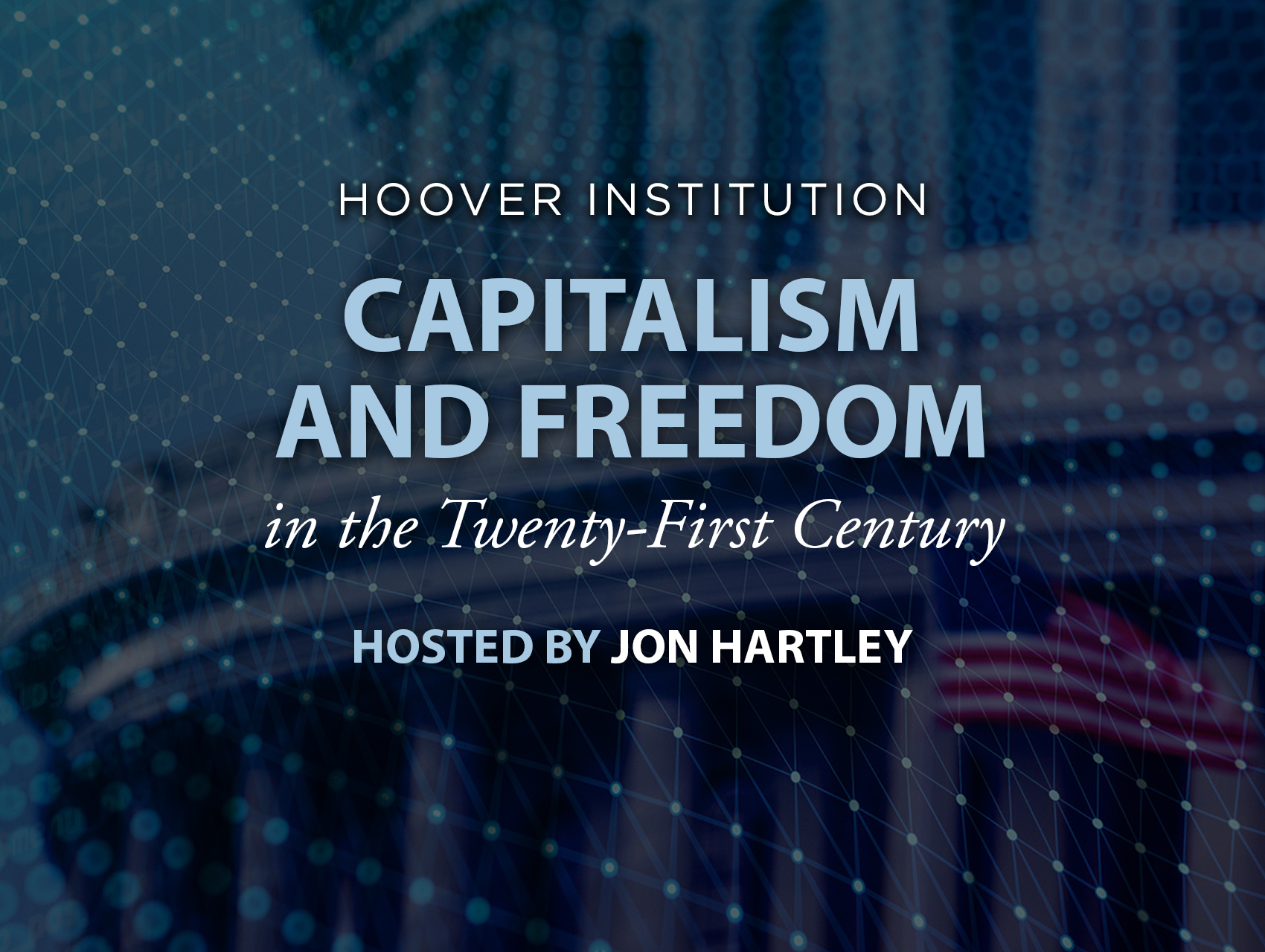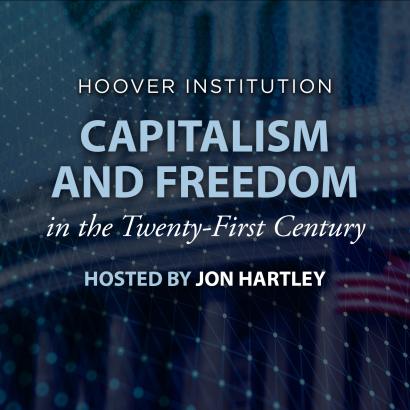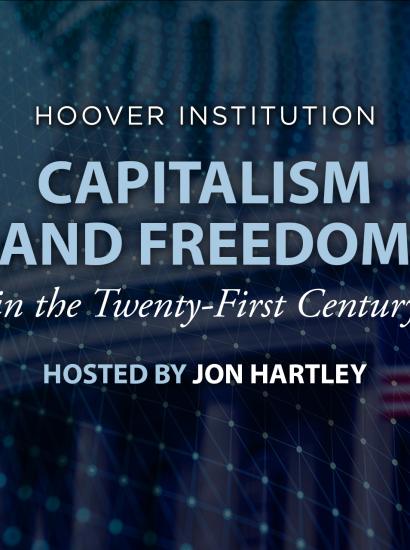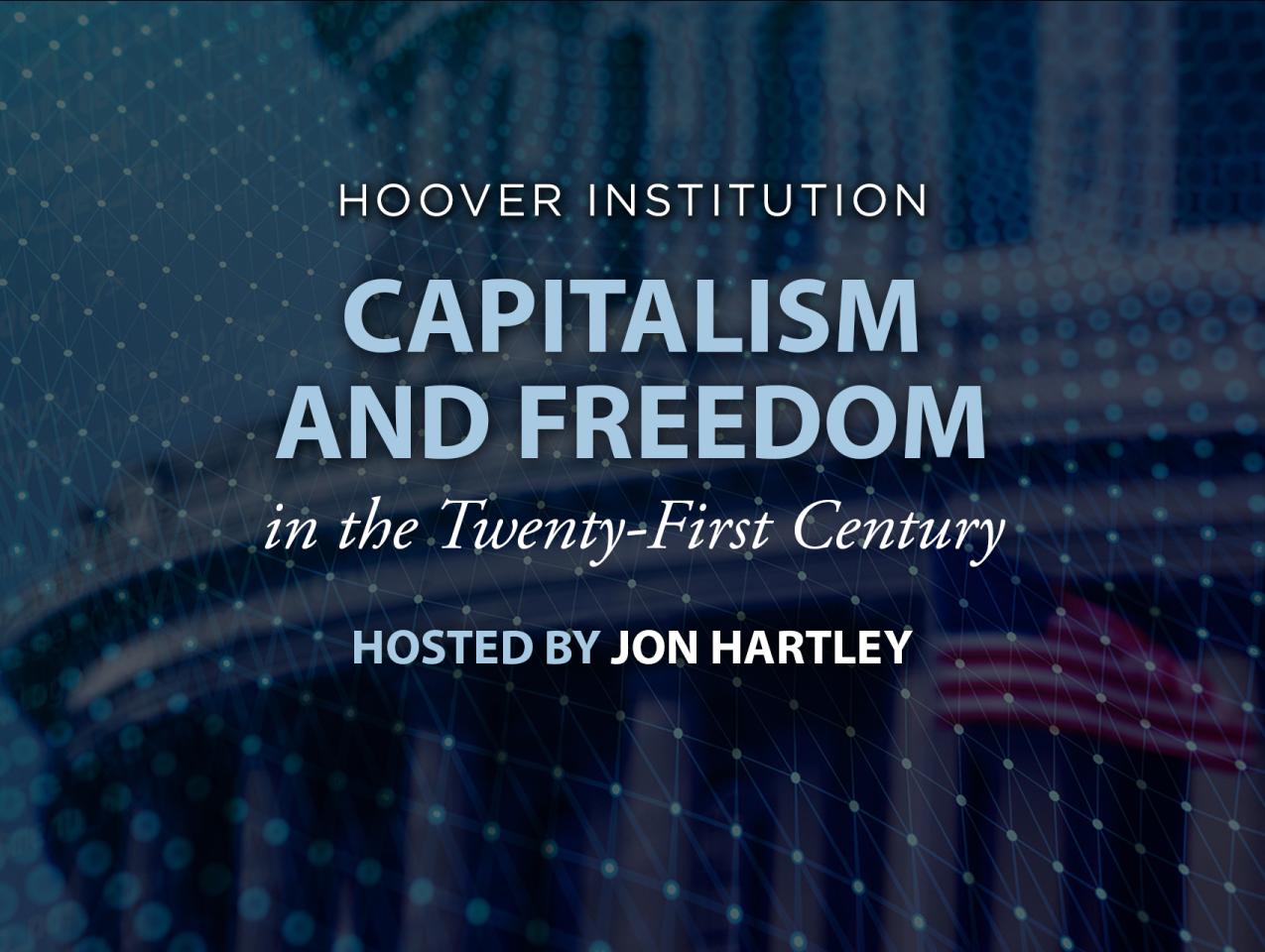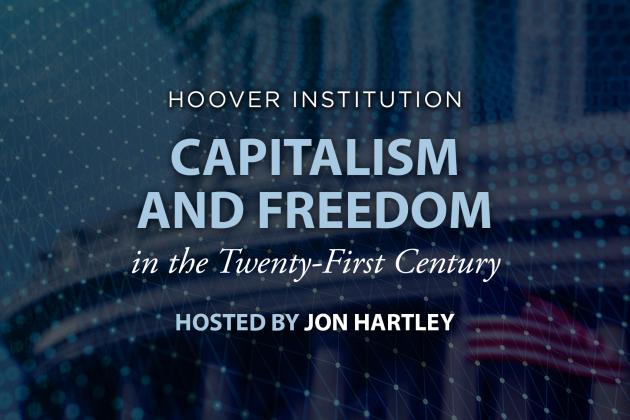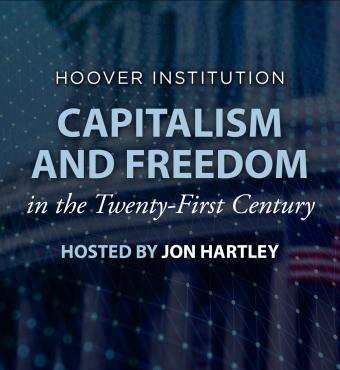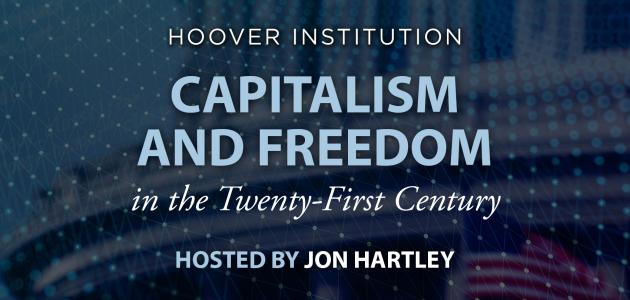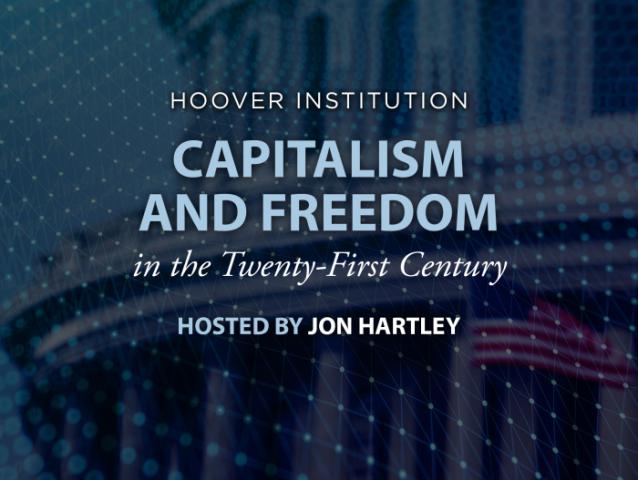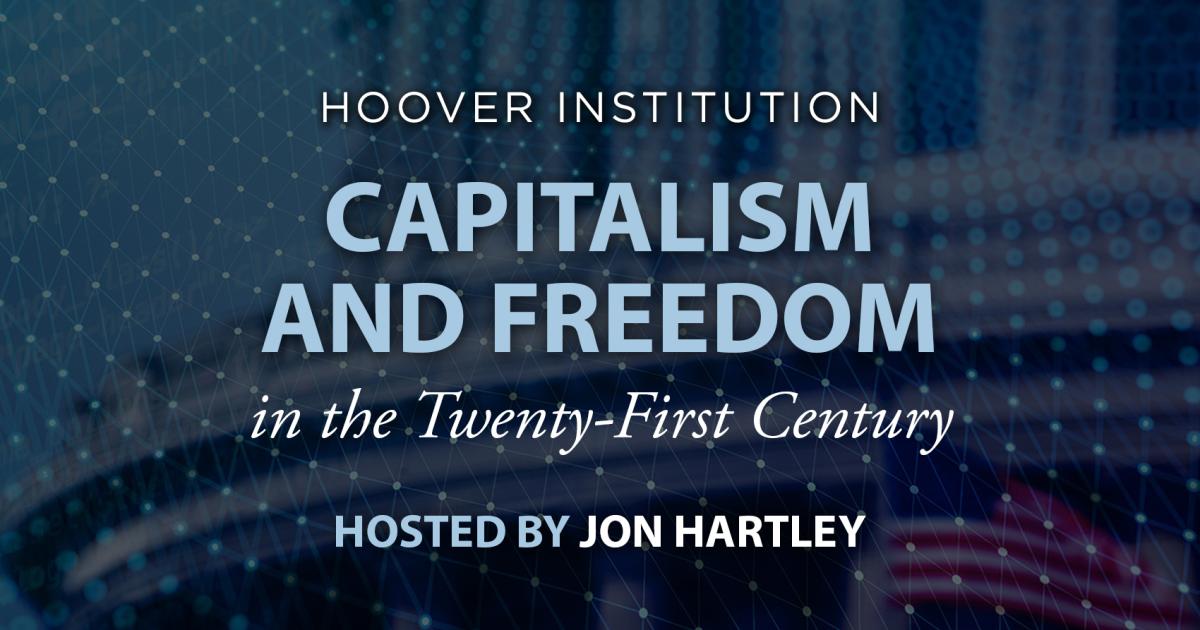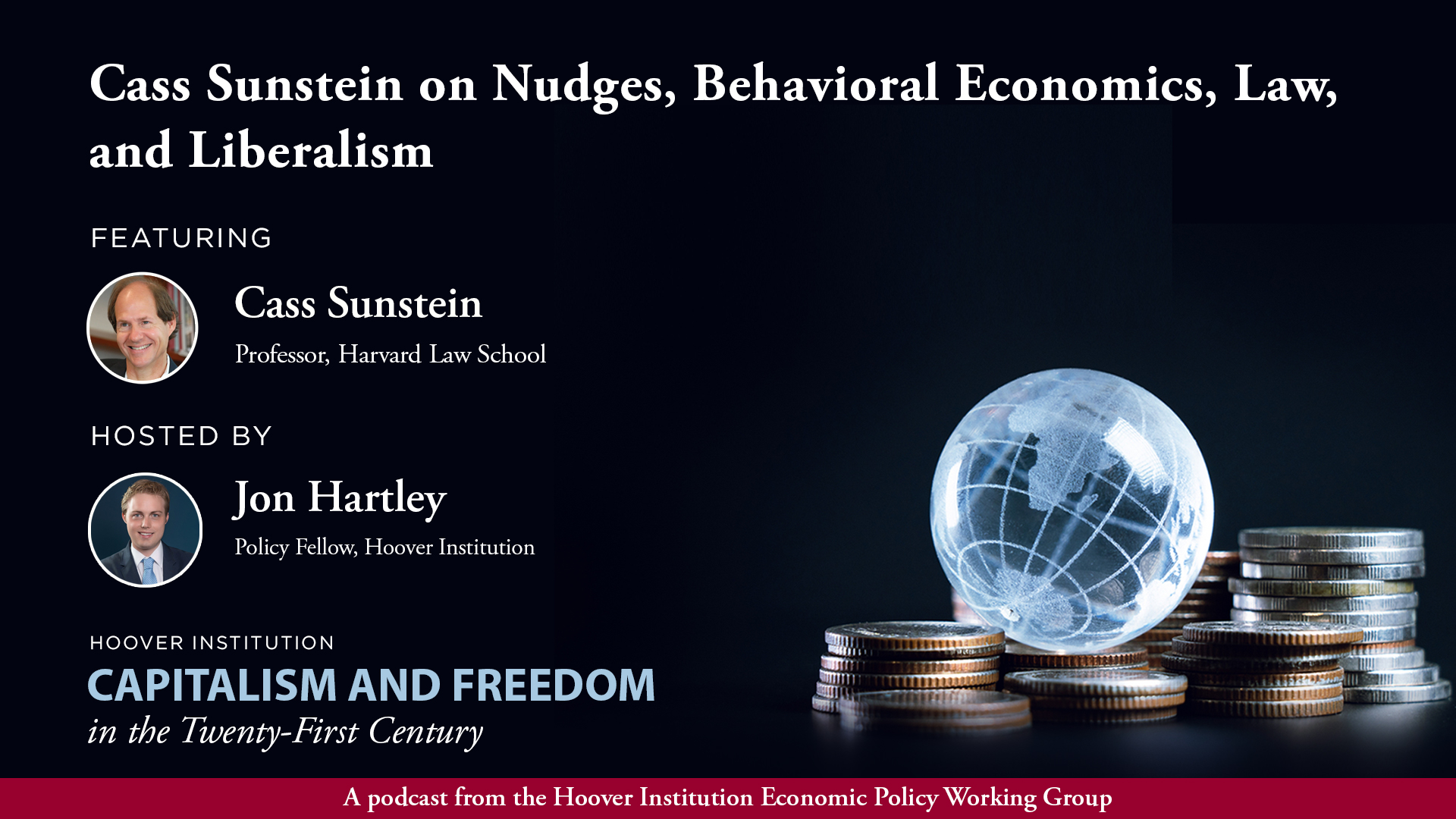- Economics
- Answering Challenges to Advanced Economies
Jon Hartley and Cass Sunstein discuss the current state as of 2025 of behavioral economics and ideas presented in Nudge (such as government nudge units), administrative law and regulation (cost-benefit analysis and regulatory budgets), Constitutional Law and separation of powers, political philosophy and liberalism.
Recorded on August 12, 2025.
>> Jon Hartley: This is the Capitalism and Freedom in the 21st Century podcast, an official podcast with Hoover Institution Economic Policy Working Group where we talk about economics, markets, and public policy. I'm Jon Hartley, your host today. My guest is Cass Sunstein, who's one of the most cited legal scholars of the 20th and 21st centuries.
He's a longtime professor at the Harvard Law School, where He's been since 2008 and previously was at the University of Chicago law School since 1981. Cass also served as the administrator of OIRA, which is the Office of Information Regulatory affairs during the Obama administration. He's also a prolific author of over 50 books, including Nudge with Richard Thaler and Noise A Flaw in Human Judgment with Daniel Kahneman and Oliver Siboney.
He's also the author of several famous law textbooks on constitutional law and administrative law. Welcome, Cass.
>> Cass Sunstein: Thank you. Great pleasure to be here.
>> Jon Hartley: So I want to just start by getting into your early life. Where did you grow up and how did you get interested in law and behavioral economics?
>> Cass Sunstein: I grew up in Wabin, Massachusetts and I was a literature major in college. I got interested in law really my senior year in college, where I thought being a graduate student in English literature would be extremely interesting, but maybe too passive. And law, I thought you could have lots of flexibility and be more in the world.
That's what my young self thought. When I came to the University of Chicago a few years later in teaching, I was surrounded by rational choice types with Gary Becker and George Stigler leading the charge and Richard Posner and Bill Landis at the law school being the formidable giants who were surrounded me.
I felt like I was 3 foot tall and they were all 9ft tall. I was a little person trying to understand. They were so high in the clouds I could barely hear their voices, though they were booming. But I was a literature major and I thought that their conception of humanity was not the same as what I had learned from James Joyce and William Shakespeare and William Butler Yates and John Keats.
And so I was skeptical, kind of cluelessly skeptical. I learned something about behavioral economics from Jan Elster, who was a Norwegian political scientist philosopher who came to the University of Chicago. He introduced me to notions about pre commitment strategies and about adaptive preferences. That kind of was an inroad into the behavioral stuff.
And I started writing material that drew on Thaler and Kahneman Tversky, and it was, I think, primitive, was law professor primitive. But Thaler came to the University of Chicago at a time when I was immersed in behavioral stuff and that kind of Accelerated. We became great friends. That's kind of accelerated my focus on behavioral economics and its relationship to law.
>> Jon Hartley: Fantastic, so I want to sort of, I guess, for the moment just focus on behavioral economics. We'll get to law and political philosophy later. So you co-authored the seminal book, Nudge, cast on scene in 2008. I remember it as a pretty, I think, seminal moment for behavioral economics.
And it really, I think, increased the popularity of behavioral economics. I mean, at the same time you sort of had the global financial crisis was sort of around the same time. But I just remember, you know, that really the, you know, late 2000s and. And 2010s was a very, very a popular time for behavioral economics.
He also wrote a book more recently, Noise, with Daniel Kahneman and Oliver Sibony. Daniel Kahneman being the famous Kahneman Tversky. I'm curious what you think about the state of behavioral economics is now following what I think has been just as sort of, I see it, I think, maybe a more challenging time for behavioral economics.
We've had some recent controversies, a lot of controversy, particularly in the field of psychology. A massive fraction of studies there aren't replicable. I think there's been some very famous scandals within the behavioral economics world, think Dan Arielli, Francesca Gino, Francesca. You've been in several of their papers have been retracted, following the uncovering from the folks at Data Colada.
And to me, I mean, it seems like behavioral economics maybe peaked around the times of the Richard Thaler Nobel and the Robert Shiller Nobel in sort of the mid 2010s. And maybe it's been on a bit of a decline. I mean, would you agree with that? Tell me why either that's wrong or where you think the state of behavioral economics is as we see it today in 2025.
>> Cass Sunstein: Okay, thanks for that. I'll tell you a story and then we'll maybe talk about something in the vicinity of data. So the story is I had dinner not long ago with a behavioral economist. And he said it's terrible. And I said what's terrible? And he said it's so terrible.
And I said what do you mean it's so terrible? And he said the demand for people doing behavioral economics is higher than it's ever been by far that people in the private sector, Silicon Valley and Saudi Arabia, in Germany, in France and Italy, are looking for people in the private sector who are trained in behavioral economics.
Governments are keener than ever that we're seeing interest in hiring behavioral economists from people who are running behavioral insights teams or nudge units. The demand is off the charts and it's higher than ever. And I said, why is it terrible? That sounds amazing. He said, there aren't enough people.
So the, the people are holding themselves out as behavioral economists or behavioral scientists to get jobs, but they're not trained. The field is flourishing with such, you know, kind of exuberance on the part of the people who are interested in it, and there just aren't enough people ready.
And he said, you've got to get people at Harvard ready to go help people who are thinking about smoking, secession or road safety or how to get people to pay fines when they're not paying fines, how to get people to take up programs, how to deal with occupational licensing.
So on the practitioner side, from government and the private sector, behavioral economics is incalculably better off than it was even six, seven years ago. On the academic side, the same is true. If you look at the leading economics journals, if there isn't at least one behavioral economics paper in the current issue, it's surprising if there isn't one the year before or the year after.
I'm sorry, the issue before or the issue after a year is too much. There are too many papers in behavioral economics in the American Economic Review, in the Economic Journal, and the Quarterly Journal of Economics. And some of it is kind of normal science where loss aversion is used to explain something, and loss aversion is identified in a context that we didn't see something might be appearing on default.
Default rules and their power. Benjamin Enki is doing work on complexity, which I find extremely interesting, and the role of complexity. There's a lot of work on cognitive scarcity. This is something that I'm keenly interested in from Malathan and Shafir, their work on scarcity and that has implications for when behavioral findings will be especially present and when they might fall apart because people are focusing on something and so they're not going to show loss aversion because if they do, they're going to lose a lot of money in a hurry.
So that's very vivid. John List, of course, has done a ton of phenomenal papers in the domain of behavioral economics. And if we don't see a good John List paper in any four month period, that's a surprising four month period. There's keen interest in both economics and in other domains in manipulation and how to think about it.
Sometimes it goes by specific names like dark patterns, or sometimes there's a specification of the exploitation of a behavioral bias. This also connects with work on algorithms and machine learning. So behavioral economics right now is both on the practice side and on the theoretical side in a better position, I'd say, by far, than it's ever been.
There isn't explosive insight, period that we saw with early Kahneman and Tversky or Thaler, but we see much more in terms of insights and much more specificity and new insights coming that are often firmer, they might be consistent with, but firmer than anything we've observed before just because the techniques are better on replication.
Thaler has a new edition of the Winner's Curse coming out, I think in September 2025. And all of the findings replicate every single one. So that's, I think his exposition challenge in this amazing new edition of the Winner's Curse is not to be kind of crowing at the replication of the core findings, but they all replicate.
And to say they replicate is one thing to say the magnitude or the conditions under which, et cetera, like you can make the endowment effect go down or disappear if people are really sad, as I recall, you don't see an endowment effect, but the central findings of that defining book all replicate.
So within the field, by which I mean both practitioners and people are doing real academic work. I'm thinking of Alex Moss, whom I don't know, but whose work is very, very good. The fraud of Gino is a little like you're playing baseball and there's some player who took steroids.
I mean, baseball still pretty good sport and shouldn't take steroids and the fraud has hurt horrific. I, I don't even understand it. I should say I don't understand the state of mind suggests my limits as a behavioral scientist that I don't, I don't see how one could do that.
But that's clear with Gino and, and, but if you look at the, the extent of the field, fraud is horrific, but very limited in number. The replication challenge, as I'd, as I'd call it, I wouldn't call it a crisis. What's happening in Gaza is a crisis. Climate change, in my view, is a crisis.
The replication challenge, that's a better word than crisis, is if things don't replicate, that's basically an opportunity for learning. And the core findings replicate. We're seeing more, you know, more material that tells us more about when default rules will be powerful and exactly why you could say that a default rule won't be powerful if people hate the thing they're defaulted into and they have freedom.
Findings don't replicate. And that's, that's an advance to know that it's very important to keep at it to see, you know, is what are the boundary conditions for the availability heuristic. Stock trader probably isn't going to be vulnerable to the availability heuristic where they're going to lose a lot of money.
>> Jon Hartley: So this is kind of, I guess, how I see the maybe evolution, like behavioral economics. You had like 20, 30 years ago, you had Kahneman, Tversky, Thaler, they were sort of challenging traditional models. They get into data, find some anomaly or some bias. Aha, yes. Some new behavioral biases are discovered.
And then you also had in the sort of two, maybe 2000, 2010s, a lot of work on behavioral finance and factors and things like momentum or herding, Jeremy Stein's hurting theory paper. You also had these things like Ernest Fear's theory about fairness around that time. I think how it's evolved over time is now I think researchers are trying to find more of a unifying theory that connects these facts.
So things like I would say the complexity work, I would maybe put under that. I guess maybe more on the empirical side. I don't know if it's fair to say that, you know, RCTs and experiments, I think it's fair to say that they've certainly been the backbone, a backbone of behavioral economics.
I'm not sure if it's necessarily fair to say that every RCT or experiment is behavioral economics. I think some might disagree. And I think some of these definitions are very loose. But, you know, I think one challenge there is, you know, scaling. And I don't know, I've seen a lot of work that in my mind, like information provisions that maybe don't have significant results in that space.
But I'm just curious, like, I think one that behavioral economics, with things like default rules and information provision experiments, can't really hold a candle in terms of magnitude of the effects of these things. Is that right or wrong or. Obviously, behavioral economics is kind of meant to be the sort of third way, like idea into something very new.
I'm just curious what you think about scaling in behavioral economics ideas and implementation.
>> Cass Sunstein: Okay, so suppose we did an RCT and I put on my front lawn a sign that said don't smoke. And we had a population who drove past my front lawn and a population that didn't.
And let's. Suppose it's a big size and it's. Let's just go with the idea it's randomized and the diminution in smoking was zero. That this would be a test of a pretty pathetic nudge and whether it worked to diminish smoking in New England. And I predict that the effect would be zero.
Or we could design in a cafeteria in Palo Alto or in Cambridge, an intervention where there was a notice contains meat with respect to meat products, which would be to nudge people not to eat meat. And I have no prediction about the effect of that. But I wouldn't be surprised if the effect of the nudge was small or zero if we had a randomized trial.
So the number of nudges is. Is so large, just like, like the number of criminal punishments is so large and the number of medical interventions is so large that if you took a class and called them criminal punishments throughout, let's say, western history and the effect size of the punishment was really small and some populations are zero, that wouldn't be amazing.
And if it turned out that across a category of medicines, the effect in diminish, diminishing fatality or illness was really little, and that wouldn't be surprising if the. I hope medicine's much better now. But if you look at medicine over the course of human history, you probably get a median effect size of zero.
So I think the meta analyses of the effect of anything is imperfectly informative. So I would predict, and we have reason to think that default rules are the most powerful nudge. And there's a paper that's a meta analysis by Elkie Weber and others which shows the average or median effect, I Forget which, it's 26%.
That's very large. But even that I want to be very careful with. There's a paper by Todd Rogers and another that finds a shift opt in to opt out creates over 90% increase in participation in use of an educational technology. And there are default rules that sometimes have very limited effect.
And there are things we'd want to have. We want to use data like this to build up a theory of when a nudge has an effect. The question does the average nudge have an effect? It's kind of a crazy question. It's a little like the question, does the average increase in civil penalties have an effect?
We need to know what's the increase from and to. And what kind of civil penalty is it and do people even know about it and what's the affected population? So then we'd build up an account. I'd love it if we'd have more precision than we now do about which nudges have what kind of effect.
As a first approximation, architectural nudges have a larger effect than educative nudges like labeling or reminders. But even the category of labels and reminders, it's, it's too broad and too coarse. If you have a label that says with a smiley face, this has GMOs. I, I predict that will have very little effect in diminishing people's consumption of GMOs.
If you have something that is a graphic wording for cigarettes, it wouldn't be at all surprising if that had a significant impact on smoking secession.
>> Jon Hartley: So I guess, you know, we had this. I Think one of the biggest things that came out of all the interest in it was created and I think maybe most famously in the United Kingdom, I think this might have been during the David Cameron government that, you know, the idea was, you know, you would create a team within a government that would essentially advise on behavioral matters related to policy.
I think also around the same time, you and Richard Thaler were also big advocates of this idea of libertarian paternalism, this idea of having choice architects. The idea of incorporating behavioral findings into policy, I think was a very new thing at the time. This was around maybe 2010 or so.
I'm curious, what's the legacy of those groups like the original Behavioral Insights Team or Nudge or so called Nudge Unit in the uk? I think it's been spun up, but there's now groups in many countries that are helping to advise governments. I mean, what have been sort of made the largest contributions from nudges in that space with advising and working with governments?
>> Cass Sunstein: It's a great question and it would be worthy of a long academic article or book. And there are pieces that try to catalog those things. I'll give a couple of examples. In the United States, there's a program called Direct Certification for school Meals where if you're poor and the school knows you're poor and you're a kid, you're directly certified, meaning you don't have to apply.
And at one count, something like 10 million children were benefiting from nutritious free lunches and breakfasts to which they were entitled. And the Direct certification program was something in which they participated. So that's millions of kids getting to participate in school meal programs by virtue of the shift from opt in to opt out.
Another one that is not a product of any particular nudge unit, but which is a product of behavioral economics research, is green by default. So we're seeing people who are automatically enrolled. This is a big program in Switzerland, as I recall. It's big in Germany. It's big in Southern California, where people are automatically enrolled in green energy.
They can opt out, go into coal if they want, but that has very large effects in reducing pollution, including greenhouse gas emissions. And in some places it leads to higher electricity bills. But people aren't opting out. So that's kind of a big legacy item. In the United States, people are, whenever they buy a car, it has a camera in it that where you can see behind.
And this was a rule I got to be involved in. It's not, it's. It has a nudge component that is you're nudged to look at the camera and to avoid smashing into a small kid or a dog or something physical and strong that'll batter your car. So it has a strong behavioral nudge feature in it.
The mandate itself of the cameras and the cars is a mandate, not a nudge. But it was very much, I can attest, behaviorally informed by thinking about limited attention on the part of drivers. And there are people, including very little people, not because they didn't grow, but because they're children who are not dead because of that.
And that's a, you know, very significant policy intervention. Dick Thaler would refer to automatic enrollment and retirement plans. And that's kind of the most visible, I confess, because I never want to retire. And the idea of retirement gets my system, one that is the intuitive automatic system in the brain.
Sad I I the retirement one isn't the one that comes first to mine for me, but is true that automatic enrollment in retirement plans is a big deal, but there are 1001 uses of automaticity. The OECD now has a big project on sludge sludge audits, reducing administrative burdens of various sorts.
Now, you can think of sludge as a problem even if you have no interest in or enthusiasm for behavioral economics. But the fact is that sludge route of behavioral economics, the concept and the. Concern about the adverse effects of administrative burdens on, like, entrepreneurs or innovators, or on people who want to build things like build housing, or on people who are seeking access to employment or other opportunities.
Sludge is devastating, often because of behavioral characteristics of our species.
>> Jon Hartley: I guess. Speaking of nudge units and regulatory policy, I sort of want to segue into your time at oira. So during the Obama administration, you led oira, which is the Obama administration's, I guess, chief regulatory rulemaking sort of oversight function.
And during this time, I think you certainly were described as a pioneer and someone who'd held the role. Some folks, like, I think Richard Epstein, said that because you're one of the more conservative folks in the Obama administration. But one of the ideas that you champion, I think, was this idea of a regulatory budget.
And some people were calling this regulatory money ball, I think, at one point. And I think it's something that really, actually was truly adopted in the first Trump administration and that they really followed this idea that every new rule that it created, for every new rule they create, they would delete a rule.
>> Cass Sunstein: Okay, so the idea that I was very enthusiastic about and certainly didn't originate was in his cost benefit analysis. So the idea of careful analysis of the costs and benefits of regulatory options, including alternatives to the proposal that is being offered to the American people, seems to me essential.
And you can, and many economists do, like cost benefit analysis, who have no interest in behavioral economics. The idea of cost benefit analysis outruns behavioral economics, was pioneered by people who were not particularly keen necessarily on behavioral economics or didn't know what it was. But I like behavioral economics because it is a corrective to behavioral biases which people in government, either because they're human or because they're responsive to people outside government, are subject to.
So you might think, I heard of a case in which a risk came to fruition. There ought to be a law, let's regulate that. But it may be that the case was an outlier, very rare, and that the costs of regulating outrun the benefits. So cost benefit analysis as a foundation for every environmental rule, every highway safety rule, every food safety rule, I really like that idea.
There may be cases where it's challenging to quantify, but the economic Constitution of the United States, I say, should and does have cost benefit analysis at its heart. Let's distinguish that from a regulatory budget. The idea of having a ceiling on the cost of regulation in a year, I don't like that idea because if.
And so the regulatory budget idea is one to which I'M opposed. I get it, but I don't like it. The reason is if you have a regulation in a year, let's say, that costs $5 billion, and then you have three others that cost $8 billion, now we're up to $13 billion in cost, and then you have four others and the cost is starting to get really high.
That might be horrific depending on what you get in return for them. If you get in return for them $100 million, it's a catastrophe. You shouldn. But if you get in return for them $100 billion in benefits, then go for it. So cost benefit analysis, hooray. Regulatory budget.
A kind of sympathetic and respectful boo reaction. Cost benefit analysis right now isn't riding as high as I would like to in the US Government, and the reason isn't running as high as I would like is that the Biden administration didn't, let's just say, put cost benefit analysis at the foundation of its regulatory policymaking.
It had environmental and other goals that I hope were broadly compatible with cost benefit balancing. But it wasn't, because cost benefit analysis was in the driver's seat. And in the Trump administration, the deregulatory efforts, some of which I applaud, some of which I don't like so much, the deregulatory efforts seem to be founded on a policy commitment that is not grounded in empirical analysis of costs and benefits.
So the regulatory budget idea I'm not for. I don't like the idea of one regulation in, 10 out. I think that's random and a gimmick. If you have a year where you have three regulations out and 500 in, that might be a good year, depending on their content.
If you have a year with three regulations in and 500 out, that might also be a good year, depending on their content. What we want is careful cost benefit assessment of existing regulations. And we did that in the Obama administration, at least for starters. I would applaud the current administration if it did careful assessment of existing regulations in terms of cost benefit analysis in deciding whether to get rid of them.
And you'd get rid of a lot of them if you did cost benefit analysis of whether they made sense. So there's a happy alternative universe which I hope will arrive at, in which the regulatory state really is a cost benefit state.
>> Jon Hartley: I think one of the other things you were an advocate of in the first or in the Obama administration, correct me if I'm wrong, was occupational licensing deregulation, meaning that workers can take their license from one state to another.
Don't have to take additional new exams. You know, say a nail technician in Maryland can also work in Virginia and doesn't have to get an entirely new license. This is a huge challenge for people that move a lot. So, you know, spouses of folks in the military that are moving quite frequently and if, you know, they're a licensed worker, they often have to get relicensed, which is a huge tax and huge burden.
Here's what you think about all the progress on that.
>> Cass Sunstein: I'm upbeat. I think it's good. So occupational licensing, you're right, is something that I was very concerned about in government. And the fact is it's a drain on economic growth, on entrepreneurship, and on individual opportunity. So there's an old liberal idea.
By liberal, I don't mean left of center. I mean the liberal political tradition of careers open to talents. That's the idea. And libertarians tend to like it. Many progressives like it, too. And careers open to talents. It's a beautiful idea. It was a little bit boring, maybe in the 1980s because it seemed.
Yeah, of course. What else have you got? But it's not boring now. Where careers open to talents isn't something that. Is a lived reality for too many people. So the idea, if you're licensed in Arkansas, you get to do the same thing in Mississippi. A presumption in favor of that seems to me a really good idea.
Unless there are unique conditions in Mississippi such that the Arkansas license doesn't warrant that license, or unless there's something wrong with these original states licensing policies. Now this could be an opening through which you could drive a truck. But I, I want to start by saying there's a strong presumption in favor of reciprocity.
>> Jon Hartley: It's fascinating. It's amazing to see how much strides that have been made in occupational licensing. It's an area that I, I work in and sort of tracking these trends across states and, and across countries and, and I mean the US in general, at least from some of the work that I've done in a forthcoming paper with Morris Kleiner, is that the US actually has some of the most stringent occupational licensing regulations.
At least if you were to measure the fraction of workers that have a license compared to many other countries is very, very high compared to say, Europe. So it's interesting that you would think sometimes that we have a very dynamic economy in the US but there are all these sorts of barriers that exist.
Not saying that we don't need some licensing for doctors and certain professions are important, but to what degree do hair braiders and nail techs have to be licensed and so forth? Dog walkers and so forth. It's certainly an interesting topic that's made a lot of headway in recent years.
Some people might say it's still small compared to other macro things, But I'm with you in that I think it, it's more important than people realize. I think maybe about 25, 30% of the workforce has a license or so, and it's really substantial and it's used toward those people who are generally in lower incomes.
And so it's really, I think, one of those policy ideas, you know, occupational license deregulation that can actually improve opportunity for lower income individuals and help improve their productivity. So I'm with you there. I want to sort of segue into legal philosophy. You spent a lot of time, time in your career teaching law classes across a variety of fields.
You, I think, spent a lot of time working on administrative law. I just was curious, how would you describe your judicial philosophy? I kind of understand you're a judicial minimalist. You're sort of an advocate for maybe more executive and administrative decision making or more intelligent administrative decision making.
You're a fan of Experts, broadly speaking. And you recently wrote a book, Law and Leviathan Redeeming the Administrative State with your Harvard Law colleague Adrian Vermeil. Tell us more all about your judicial philosophy.
>> Cass Sunstein: Okay, so there are a couple things I like. If there's the idea at a highest level of abstraction, the idea is deliberative democracy.
So a deliberative democracy is something associated with the German philosopher Jurgen Habermas. John Rawls has endorsed it. James Madison was a deliberative democrat in economics. Amartya Sen is an enthusiast for deliberative democracy at Stanford. James Fishkin is a fan of deliberative democracy. And the basic idea here. We'll get to the judges in a moment.
Is that a well functioning constitutional order combines accountability and responsiveness. That's the democracy part of deliberative democracy, with a commitment to reason giving and deliberation among people who are trying to figure things out. That's the deliberative part of deliberative democracy. So we don't have a government by referendum.
The right to instruct was rejected by the Constitution's founders on the ground that it would destroy the point of the meeting. They're supposed to deliberate with one another and figure out what's best. So deliberative democracy will naturally lead, lead to some enthusiasm for technical expertise. If you're trying to figure out how to handle road safety, intuition won't be enough.
The deliberative part requires a commitment to getting really empirical. And I see the administrative state at its best, not as it always exists by any means, as continuous with the founding commitment to a deliberative democracy. Okay, in terms of the judges, we want a judicial role that's alert to the ambition to a deliberative democracy.
And we want courts respectful of the processes of deliberative democracy and we want them attuned to ensuring that it doesn't misfire. So the most important thing the Administrative Procedure act does, maybe is to authorize courts to strike down agency action. That's arbitrary. So if an agency says that we're going to deem the social cost of carbon to be 500 because that's really big and the climate crisis is upon us, that's arbitrary.
That's not reason giving. If you say we're going to deem the social cost of carbon to be zero because we think climate change is not real, that's almost certainly arbitrary. I think the almost is just I'm being very careful here. We have to figure out what the grounding is for the administrative state doing one thing or another.
So arbitrariness as A very bad thing is consistent with the aspiration to a deliberative democracy. A democracy that's not deliberative might be arbitrary, but that's a form, I say, of authoritarianism, which runs afoul of the founding era's ambitions to have a deliberative democracy, which. Okay, then there's the rule of law.
So the book Law and Leviathan is about what the rule of law entails. And here the idea is that the rule of law has an internal morality where, and this is Hayek is an inspiration, at least in my mind, for this, that if you have a rule in the world that isn't on the books, that's not the rule of law.
So if. If in reality the enforcement officers are acting inconsistently with the rules on the books, that violates the internal morality of law. If the law is changing so rapidly that people can't plan, that's inconsistent with the rule of law. If there's retroactivity, so people do things that are fine by legal requirements in 2025, but then in 2027 they're punished that it runs afoul of the ban on retroactivity.
If people can't understand what the law is, if it's too vague or confusing, that's inconsistent with the. The rule of law, the morality of law. Now, if you have no redistribution or lots of redistribution, that might be good or bad, but it has nothing to do with the rule of law.
At least it doesn't until we specify what the legal sources. But you can do lots of stuff consistently with the rule of law. Still, the rule of law is. Central and a foundational part of the restrictions, as they should exist and frequently do exist on the operation of the administrative state.
In terms of the Supreme Court's role, I like the idea of the judges avoiding very ambitious theories and avoiding very ambitious, broad rulings. So there's some people on the left and some people on the right get excited about maximalist rulings where the court, you know, strikes down a bunch of things or adopts a theory of liberty or equality, and bam, our country is now being ordered to do all sorts of stuff.
I'm skeptical of that. The idea of judges being theoretically humble and ruling in ways that are agnostic about what liberty and equality really means. They don't have expertise on that. And it's a pluralistic society, after all. So being theoretically modest and also ruling narrowly on the case, these are presumptions.
These aren't edicts. But ruling narrowly rather than broadly, I. I like that. So here I stand with Chief Justice Roberts, who says, if it's not necessary to decide an issue in order to resolve a case, it's necessary not to decide an issue when we're resolving a case. So that's a plea for a form of minimalism, which, whether or not it's good in art, is usually pretty good for the Supreme Court of the United States.
>> Jon Hartley: I'm curious, I guess, on the topic of both the courts and deliberate democracy. I'm curious how you think about our current system and how much it has maybe strayed from how the founders maybe envisioned the sort of original Madisonian form of government. And maybe, you know, you think it's important that for it to have changed since then.
I mean, we now live in a world that's very, very different from the time of the Founders. Certainly from a national security perspective, we have nuclear weapons and so forth. But I'm just curious, you know, there's this, I would say, criticism of the current sort of state of affairs or the current regime in saying that, well, you know, Congress doesn't make laws and tries to avoid.
To deliberate. Now they don't want to decide these big issues that it's really their responsibility to decide. And then what ends up happening is they give a lot of power to the administrative state that decides a lot of things, or the presidency, the executive that decides a lot of things, and then they do things, and then sort of it goes between the executive and the courts, and the courts kind of are being forced to weigh in on these things that.
That perhaps Congress should be weighing in on. I'm curious what your thinking is about the, the current regime and how the current powers, you know, three branches of government work together compared to sort of Madison's original vision. And, and how do you think it should be, how you think it should function?
>> Cass Sunstein: It's great. It's complicated. So let's take two stabs at it. There's a grand narrative out there which your question can be taken to press, which is that we've seen successive breaches of Article 1, Article 2 and Article 3 of the Constitution. Article 1 insofar as Congress grants broad discretionary authority to the executive and administrative entities, violation or breach of Article 2 insofar as we see independent agencies exercising authority outside of the presidency, that's on the run in current constitutional law.
So the idea of independent agencies is no longer secure. It might be gone pretty soon, but it's been around since 1935. And then there's a third breach of Article 3 where a lot of adjudication is done by the executive agencies. You're putting a Spotlight on Article 1. I don't think the grand narrative is right, but I think.
But I'll get to something kind of adjacent to it that I think is right. If you look at the founding period, a lot of discretionary authority was given to the executive and to agencies and the constitutional concerns were either absent or very occasional. So the breadth of grants of authority to the executive pursuant to open ended words like reasonable is pretty eye opening in the founding period.
It's not like Congress made all the decisions and so, okay, and said to the executive, okay, do what we just said. Instead Congress said do what's reasonable or appropriate, things like that. So there's real continuity between the first, second Congress and first and second Congress and what we now observe, the idea that independent agencies are constitutional affront or barnacle, that's also hard to defend.
Independent agencies were around in the founding period and it looks like most people then thought that was constitutionally fine. The adjudication issue is a little more complicated and the magnitude of adjudication done by the administrative state now is very plausibly out of accord with constitutional expectations. Okay, there's all that.
It's clearly the case that the breadth and and ex magnitude of executive branch authority was not expected. And I think it's less because there's discretion than the number of domains in which discretion is exercised. And the power that discretion is exercised with respect to way outruns the founding period.
So if you think of the EPA or the Department of Transportation or the Social Security Administration or the Federal Communications Commission, or the Federal Trade Commission. My gosh, they're doing all sorts of stuff that at the founding, the national government wasn't expected to do. The Department of Labor.
So whether this is an affront of the Constitution is, I think, not at all clear. Because what part of the Constitution does it violate is a very fair question. It's not clear it violates any part of the Constitution, but it's very different from what was anticipated. Now, this is a large question.
No modern industrialized society looks like the founding era or 40 years after the founding era government. So we're not seeing that in Canada or France or Italy or Germany. Not that any of those is perfect. But the idea that we would have a small national government akin to that of, let's say, 1830, that seems cray cray.
I think. So that's cool person talk for crazy. I'm trying to be a cool person. So failing, evidently. But the, the, the mission of trying to discipline the administrative state by reference to the rule of law and to cost benefit analysis, including elimination of administrative burdens and barriers and sludge.
That's a really honorable mission.
>> Jon Hartley: That's fascinating. I guess you just maybe broadly. Thank you. Here, just about political philosophy and liberalism, you've written quite a bit. Bit about political philosophy as well, in particular about liberalism. In 2023, you wrote a New York Times essay titled why I Am a Liberal.
Does the term liberal mean a whole lot anymore? I'm just curious. There's everything from economic liberals to social liberals. Many who I would say are firmly in one camp and firmly not in the other, which traditionally I'd say would be a key distinction between maybe Republicans and Democrats, at least from the 1980s through maybe 2016.
I'd say it would probably go back even further, maybe even pre the time of Buckley and others in maybe the 50s. Now, Locke also talks about a lot about moralism in book four of the essay concerning human understanding. And certainly I think it's fair to say that the founders believe that morals writing about nature's God and the laws of nature and then declaration.
So I think there's some today, namely the post liberals, that might characterize them as libertarians, you know, in social liberals. But, you know, I think that's somewhat historical and untrue. And I mean, they also were in favor of tariffs as well. So, you know, I think calling them full economic libertarians I think wouldn't be true either.
Now, they certainly believed in property rights. That was something that was foundational. And they certainly believed in, you know, fighting the excesses of government. You know, they're fighting, you know, very small taxes by compared to the taxes today. And that in part the American Revolution. Obviously, you know, economic liberalism, property rights has been responsible, in my opinion, for enormous amounts of economic growth.
And maybe there's some unintended consequences of that. But I'm curious, what does it mean to be a liberal today as you see it? And are there limits on liberalism as you see it, if any?
>> Cass Sunstein: Okay, so a liberal today believes in freedom and pluralism and the rule of law.
That's a triumvirate, a holy trinity. Freedom, pluralism and the rule of law. Ronald Reagan was a liberal. Barry Goldwater was a liberal. Barack Obama is a liberal. Franklin Delano Roosevelt was a liberal. So this is a big tent. Hayek was emphatically a liberal, no question about that. John Stuart Mill, also Robert Nozick for sure.
John Rawls, definitely Susan Okun, Stanford's political scientist, no question at all. So I have a book coming out in just a couple weeks called Liberalism in Defense of Freedom and, and I almost called it Big Tent Liberalism. Now, the disagreements between Susan Okun, for example, and John Rawls are fierce.
The disagreements between Robert Nozick on the one hand, and Joseph Raz, a philosopher who was a liberal, died not long ago. Those are also fierce. But pluralism, freedom, and the rule of law are a shared set of convictions. I think it's. It's like, really important for those who are part of the liberal tradition to stand up and say so, even if they disagree, you know, very fiercely with people who are also part of the liberal tradition.
So I feel, right now, I'm not a libertarian, but I feel libertarians are my brothers and sisters. I worked in the Reagan administration as the Department of Justice. I had some serious, serious disagreements with President Reagan, but, you know, my. My intellectual sibling and commitment to liberalism. So this might not have seemed as important 30 years ago as it is now, but given what's happening in Russia and China, in various parts of the world, given the illiberal left, which is sometimes not that excited about freedom of speech on campus or elsewhere, not just the Marxist left, but the illiberal left, given the illiberal right in Hungary, for example, where the idea is a democracy, that's illiberal, I think it's an oxymoron, but we understand what the sentence means.
To put a spotlight on freedom, pluralism, and the rule of law as composing the liberal tradition is a big step forward, and it may be, you know, of. Of great importance in the next 50 years.
>> Jon Hartley: Well, Cass, I really want to thank you for coming on. This has been an amazing conversation, and you've had such a prolific career.
It's a true honor to have you.
>> Cass Sunstein: On, an honor to be able to talk to you. Thank you.
>> Jon Hartley: This is the Capitalism and Freedom the 21st Century podcast, an official podcast of the Hoover Institution Economic Policy Working Group, where we talk about economics, markets, and public policy.
I'm John Hurley, your host. Thanks so much for joining us.
ABOUT THE SPEAKERS:
Cass R. Sunstein is currently the Robert Walmsley University Professor at Harvard and the founder and director of the Program on Behavioral Economics and Public Policy at Harvard Law School. In 2018, he received the Holberg Prize from the government of Norway, sometimes described as the equivalent of the Nobel Prize for law and the humanities. In 2020, the World Health Organization appointed him as chair of its technical advisory group on Behavioural Insights and Sciences for Health. From 2009 to 2012, he was administrator of the White House Office of Information and Regulatory Affairs, and after that, he served on the President’s Review Board on Intelligence and Communications Technologies and on the Pentagon’s Defense Innovation Board. Mr. Sunstein has testified before congressional committees on many subjects, and he has advised officials at the United Nations, the European Commission, the World Bank, and many nations on issues of law and public policy. He has served as an adviser to the Behavioural Insights Team in the United Kingdom.
Mr. Sunstein is author of hundreds of articles and dozens of books, including Nudge: Improving Decisions about Health, Wealth, and Happiness (with Richard H. Thaler, 2008); Simpler: The Future of Government (2013); The Ethics of Influence (2015); #Republic (2017), Impeachment: A Citizen’s Guide (2017)’ The Cost-Benefit Revolution (2018); On Freedom (2019); Conformity (2019); How Change Happens (2019); and Too Much Information (2020). He is now working on a variety of projects involving the regulatory state, “sludge” (defined to include paperwork and similar burdens), fake news, and freedom of speech.
He served as senior counselor to the Secretary of Homeland Security during the Biden administration, where he focused on resilience against weather-related risks (such as flooding and extreme heat) and on the reduction of administration burdens; he was awarded the Distinguished Public Service Medal, the Department’s highest civilian honor, in 2024.
Jon Hartley is currently a Policy Fellow at the Hoover Institution, an economics PhD Candidate at Stanford University, a Research Fellow at the UT-Austin Civitas Institute, a Senior Fellow at the Foundation for Research on Equal Opportunity (FREOPP), a Senior Fellow at the Macdonald-Laurier Institute, and an Affiliated Scholar at the Mercatus Center. Jon also is the host of the Capitalism and Freedom in the 21st Century Podcast, an official podcast of the Hoover Institution, a member of the Canadian Group of Economists, and the chair of the Economic Club of Miami.
Jon has previously worked at Goldman Sachs Asset Management as a Fixed Income Portfolio Construction and Risk Management Associate and as a Quantitative Investment Strategies Client Portfolio Management Senior Analyst and in various policy/governmental roles at the World Bank, IMF, Committee on Capital Markets Regulation, U.S. Congress Joint Economic Committee, the Federal Reserve Bank of New York, the Federal Reserve Bank of Chicago, and the Bank of Canada.
Jon has also been a regular economics contributor for National Review Online, Forbes and The Huffington Post and has contributed to The Wall Street Journal, The New York Times, USA Today, Globe and Mail, National Post, and Toronto Star among other outlets. Jon has also appeared on CNBC, Fox Business, Fox News, Bloomberg, and NBC and was named to the 2017 Forbes 30 Under 30 Law & Policy list, the 2017 Wharton 40 Under 40 list and was previously a World Economic Forum Global Shaper.
ABOUT THE SERIES:
Each episode of Capitalism and Freedom in the 21st Century, a video podcast series and the official podcast of the Hoover Economic Policy Working Group, focuses on getting into the weeds of economics, finance, and public policy on important current topics through one-on-one interviews. Host Jon Hartley asks guests about their main ideas and contributions to academic research and policy. The podcast is titled after Milton Friedman‘s famous 1962 bestselling book Capitalism and Freedom, which after 60 years, remains prescient from its focus on various topics which are now at the forefront of economic debates, such as monetary policy and inflation, fiscal policy, occupational licensing, education vouchers, income share agreements, the distribution of income, and negative income taxes, among many other topics.
For more information, visit: capitalismandfreedom.substack.com/







